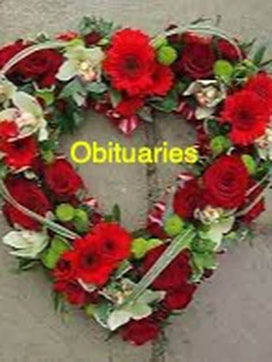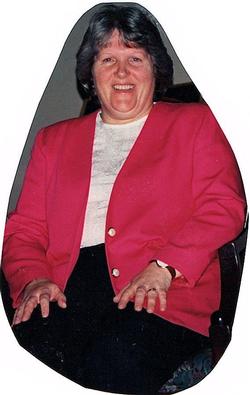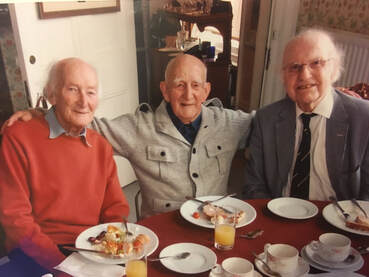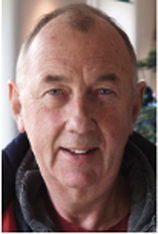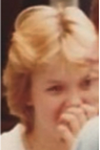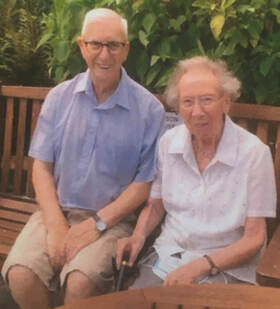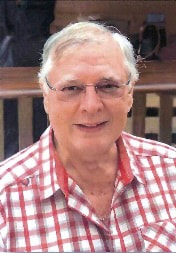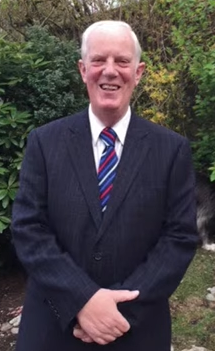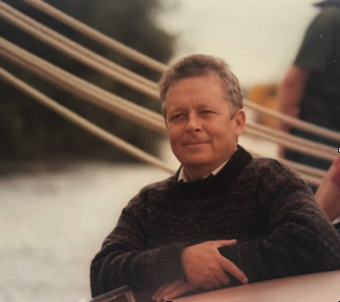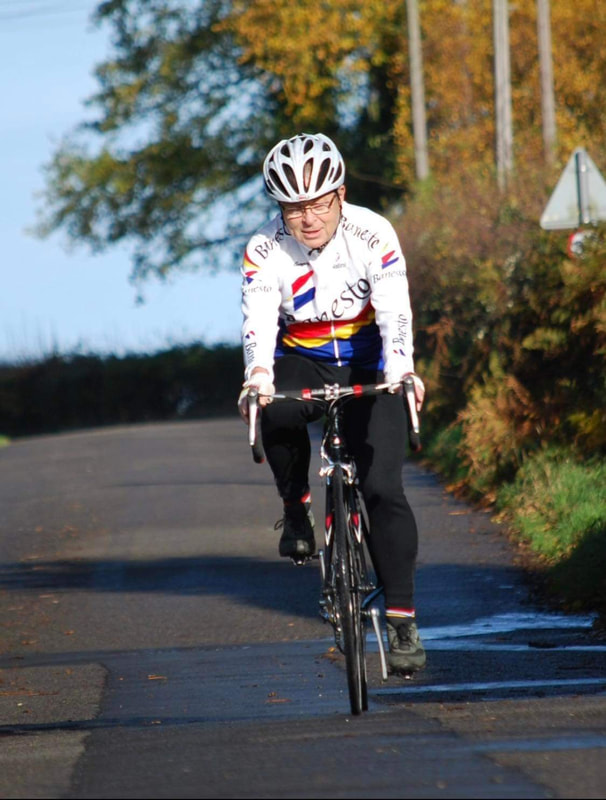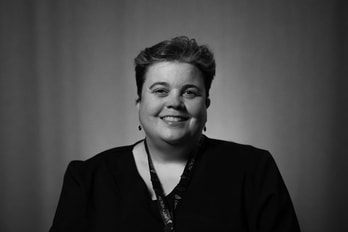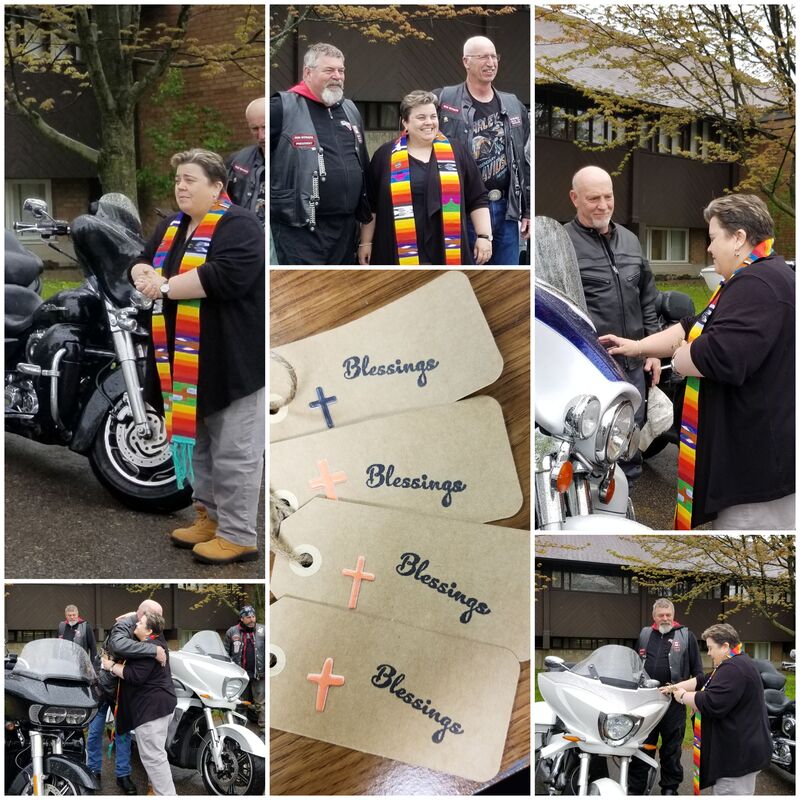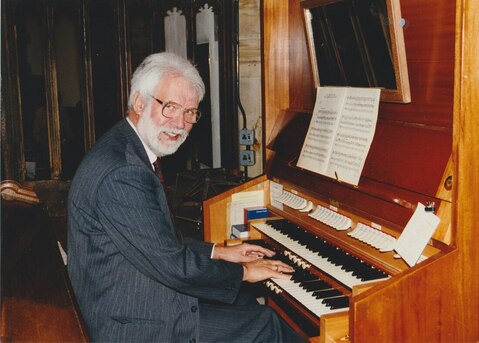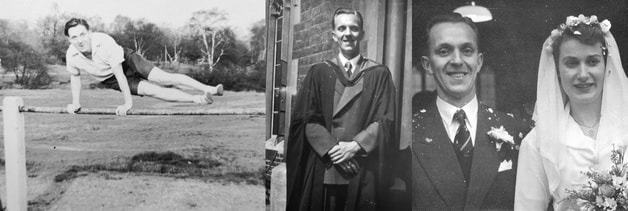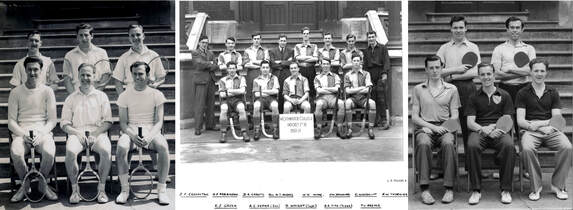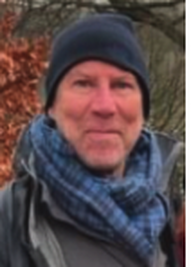|
Ablard, Muriel, 1960-63
Muriel Ablard (d. 31 December 2014) was born in Wigan near Liverpool England to Tom and Nellie Ashcroft on May 20th, 1942. She had two brothers and two sisters all deceased. She attended local schools, and Orrell Methodist Church where she served as Sunday school teacher, choir member, youth group leader and local preacher. She attended Westminster Teachers College Oxford from 1960 - 1963 and taught in local schools until 1979. On February 11, 1967 she married Gilbert Ablard, a "Marriage planned and guided by God into an exciting adventure until 2008".(her words) Muriel attended Western Evangelical Seminary from 1979 - 1981 and later Pastored with Gilbert in Ontario, Canada, Arizona and Oregon. The couple retired to Sheridan in 2006 where Muriel worked as substitute teacher, volunteer at Opportunity House, Pastoral Counselor, tutor and mentor. "I never believed that retirement was a Biblical concept." Muriel's personal life statement: "To know God and to show the Power of Jesus Christ to others." |
|
Baxter, Jack H, 1949-51, (pictured centre with Willis Johnson (left) and Maurice Page (right) in 2017) died December 2021 following increasingly poor health. A history teacher, Jack was well-known in the world of genealogy for his authoritative index of Essex Burials 1813-65. A fully active Methodist, Jack attended a Salvation Army hall in his later years.
Jack was born on 22 August 1929, the younger son of Grace Nichols & Eaton Barnes Baxter, who had met while working for The Gramophone Company (later HMV/EMI), and settled in Leigh on Sea, Essex. His parents separated in the early 1930s and the boys’ mother, unable to support them in pre-welfare state times, reluctantly sent them to live under the care of the National Children’s Home in various locations, sometimes together, sometimes apart. Jack was found to be academically able and was given a scholarship to Woodhouse Grove, a boarding school near Bradford. He enjoyed a full school life, excelling at English, French and Latin, socialising, and participating in sports. In holiday times the brothers came back to stay with their mother in Leigh-on-Sea. He matriculated in 1947. |
Following school days, Jack did his national service in Kenya in the Royal Corps of Signals, operating telephones, radio and teleprinters.
He then trained to teach at Westminster College in Horseferry Road, specialising in French. To improve his French prior to teaching, he spent year in France as a language assistant. Jack’s first teaching post was at Westleigh School in Leigh on Sea which at the time catered for 5-14 year-olds. Following his probationary period, he was summoned in some trepidation, to an interview with the head master. ‘You are a very good teacher,’ Jack was told. A year or so later, in 1953, the teachers of the older pupils were transferred to the newly built Belfairs High Schools. He taught for over 30 years at the boys’ school, initially teaching French but soon specialising in English. Jack was consistent, fair and sensitive to particular needs of individuals, giving extra help with reading at lunchtimes. In addition to the regular curriculum, he organised cricket teams, chess clubs and continental skiing trips for pupils.
Recent comments from former pupils (now in their 70s and 80s) say of him:
‘Yes - Jack was a good teacher. I remember him well- he cycled to school……. He was one of the younger tutors - I think he was probably more on our wavelength than some of the others (he encouraged us when we formed our skiffle group).’
‘So many happy memories of Jack; one of those teachers we'll never forget - even tempered and good at his job. He will be remembered by literally thousands of us - the legacy of a great teacher.
‘A teacher that I respected’.
‘A good man who, as a worthy cricketer, had a good innings!’
One of Jack’s colleagues paid tribute to him: ‘I worked alongside Jack for eight years at Belfairs in the English Department. He was, I felt at the time, uniquely his own man. As I remember, you could always get a straightforward opinion from him, with no hedging! He had his own style of teaching and classroom management, unaffected by passing educational fads. As a probationary teacher, I observed a number of his lessons, and learned a lot from his approach. He was very much a respected colleague.’
Jack was a long-time member at Leigh Wesley Methodist Church, attending evening worship. A social group grew out of Wesley church in the 1950s called The Carisbrooke Club, which, despite many changes of personnel, is still running after 70 years. They met often for activities like quizzes, visits, and hikes. Jack loved organising his share of these. He liked active holidays: Youth Hostelling at home and abroad; skiing trips in Austria, Switzerland and France with his brother and his best friend; adventurous camping trips at home and in Europe.
When at school Jack played scrum half at rugby. He loved golf: he would play a few holes after work to calm his nerves. He ran a table tennis team and played for the same cricket team as his brother. He also liked acting. He was in plays in his college days and his most recent role was playing an old cobbler at a Salvation Army corps nativity drama. For almost forty years, he was part of the Badminton Players, a drama group based at Highlands Methodist church. (They had played badminton before deciding to become a drama group). He starred in such titles as Arsenic and Old Lace, Separate Tables and Blithe Spirit. In addition to learning his own lines, he would help others to practise theirs.
He liked books, music and listening to his radio. Caring for his mother in his own home in her later years, he bought a colour TV for her to enjoy. When later it broke down, he put it in the wardrobe where it stayed for decades. He had a reel-to-reel tape recorder in the early 60s and recorded his nephews talking when small boys. He recorded himself reading books for use at school, and for a blind friend. He did not like telephones ‘There’s a phone box opposite if I need to make a call’, but when his friends gave him a mobile, he dived into texting with great ease, well before his nephews.
In 1970 Jack decided to trace his ancestral roots. Over the next 30+ years his research, in many churches across Essex, led him to transcribe some of the registers and subsequently n to compile indexes of baptisms, marriages and burials for all of Essex. He drove to Chelmsford twice a week to do research at the Essex Record Office and was honoured as a Fellow of the Society of Genealogists.
Never one to let the grass grow under his feet, in later years Jack realised a lifetime’s ambition by travelling alone all over New Zealand, visiting genealogy contacts and seeing the sights, he gave up smoking and he joined the Salvation Army as an adherent. He told his nephew ‘I think being in the Salvation Army has made me a better person.’
Throughout his life Jack befriended people and stayed loyal to them. He routinely visited those older and infirm; he met others socially, often for meals; he shopped for his neighbours. He was many times a best man, a godfather, and a dearly loved uncle to his devoted nephews.
Everyone has a different version of Jack. – ‘wouldn’t give in’ - ‘said it as it was’, ‘lively little man’ - ‘a mind that will be missed’ – ‘lovely caring man’
Goodbye Jack - Au revoir – or, as he’d say, ‘reservoir – olive oil’.
The above is adapted from the tribute paid by his nephews, Keith and Richard to Jack at his funeral in late January 2022. Jack was a regular at gatherings of the East Anglian group of Old Ws. It was his nephews who made sure he was able to attend them by so willingly acting as his chauffeur, no matter how far the distance. Jack’s spirit and enthusiasm was much admired by us all.
Margaret Baldry (Law) ‘67
He then trained to teach at Westminster College in Horseferry Road, specialising in French. To improve his French prior to teaching, he spent year in France as a language assistant. Jack’s first teaching post was at Westleigh School in Leigh on Sea which at the time catered for 5-14 year-olds. Following his probationary period, he was summoned in some trepidation, to an interview with the head master. ‘You are a very good teacher,’ Jack was told. A year or so later, in 1953, the teachers of the older pupils were transferred to the newly built Belfairs High Schools. He taught for over 30 years at the boys’ school, initially teaching French but soon specialising in English. Jack was consistent, fair and sensitive to particular needs of individuals, giving extra help with reading at lunchtimes. In addition to the regular curriculum, he organised cricket teams, chess clubs and continental skiing trips for pupils.
Recent comments from former pupils (now in their 70s and 80s) say of him:
‘Yes - Jack was a good teacher. I remember him well- he cycled to school……. He was one of the younger tutors - I think he was probably more on our wavelength than some of the others (he encouraged us when we formed our skiffle group).’
‘So many happy memories of Jack; one of those teachers we'll never forget - even tempered and good at his job. He will be remembered by literally thousands of us - the legacy of a great teacher.
‘A teacher that I respected’.
‘A good man who, as a worthy cricketer, had a good innings!’
One of Jack’s colleagues paid tribute to him: ‘I worked alongside Jack for eight years at Belfairs in the English Department. He was, I felt at the time, uniquely his own man. As I remember, you could always get a straightforward opinion from him, with no hedging! He had his own style of teaching and classroom management, unaffected by passing educational fads. As a probationary teacher, I observed a number of his lessons, and learned a lot from his approach. He was very much a respected colleague.’
Jack was a long-time member at Leigh Wesley Methodist Church, attending evening worship. A social group grew out of Wesley church in the 1950s called The Carisbrooke Club, which, despite many changes of personnel, is still running after 70 years. They met often for activities like quizzes, visits, and hikes. Jack loved organising his share of these. He liked active holidays: Youth Hostelling at home and abroad; skiing trips in Austria, Switzerland and France with his brother and his best friend; adventurous camping trips at home and in Europe.
When at school Jack played scrum half at rugby. He loved golf: he would play a few holes after work to calm his nerves. He ran a table tennis team and played for the same cricket team as his brother. He also liked acting. He was in plays in his college days and his most recent role was playing an old cobbler at a Salvation Army corps nativity drama. For almost forty years, he was part of the Badminton Players, a drama group based at Highlands Methodist church. (They had played badminton before deciding to become a drama group). He starred in such titles as Arsenic and Old Lace, Separate Tables and Blithe Spirit. In addition to learning his own lines, he would help others to practise theirs.
He liked books, music and listening to his radio. Caring for his mother in his own home in her later years, he bought a colour TV for her to enjoy. When later it broke down, he put it in the wardrobe where it stayed for decades. He had a reel-to-reel tape recorder in the early 60s and recorded his nephews talking when small boys. He recorded himself reading books for use at school, and for a blind friend. He did not like telephones ‘There’s a phone box opposite if I need to make a call’, but when his friends gave him a mobile, he dived into texting with great ease, well before his nephews.
In 1970 Jack decided to trace his ancestral roots. Over the next 30+ years his research, in many churches across Essex, led him to transcribe some of the registers and subsequently n to compile indexes of baptisms, marriages and burials for all of Essex. He drove to Chelmsford twice a week to do research at the Essex Record Office and was honoured as a Fellow of the Society of Genealogists.
Never one to let the grass grow under his feet, in later years Jack realised a lifetime’s ambition by travelling alone all over New Zealand, visiting genealogy contacts and seeing the sights, he gave up smoking and he joined the Salvation Army as an adherent. He told his nephew ‘I think being in the Salvation Army has made me a better person.’
Throughout his life Jack befriended people and stayed loyal to them. He routinely visited those older and infirm; he met others socially, often for meals; he shopped for his neighbours. He was many times a best man, a godfather, and a dearly loved uncle to his devoted nephews.
Everyone has a different version of Jack. – ‘wouldn’t give in’ - ‘said it as it was’, ‘lively little man’ - ‘a mind that will be missed’ – ‘lovely caring man’
Goodbye Jack - Au revoir – or, as he’d say, ‘reservoir – olive oil’.
The above is adapted from the tribute paid by his nephews, Keith and Richard to Jack at his funeral in late January 2022. Jack was a regular at gatherings of the East Anglian group of Old Ws. It was his nephews who made sure he was able to attend them by so willingly acting as his chauffeur, no matter how far the distance. Jack’s spirit and enthusiasm was much admired by us all.
Margaret Baldry (Law) ‘67
Blake, Rebecca 'Becky' (Atkinson), 1984-88, d. 9 July 2022 a few days before her 56th birthday to motor neurone disease and cardiac arrest. Her illness was relatively brief, only diagnosed earlier this year. Her funeral was on 4 August at St Paul's Salisbury.
Booton, Catherine Ruth, ‘Clare’, (Bradshaw), 1964-67, b. September 1945, d. 16 June 2021 in Yeovil District Hospital, while living in Thorncombe, Chard, Somerset.
Booton, Catherine Ruth, ‘Clare’, (Bradshaw), 1964-67, b. September 1945, d. 16 June 2021 in Yeovil District Hospital, while living in Thorncombe, Chard, Somerset.

Bowman, Alan Matthew, 1953-55 b. 1934 It is possible that Alan is still with us. If so, apologies for placing these lovely memories here. Alan ('Dizzy') Bowman from a Stockton-on-Tees archive: Paul Twizzell, pupil at Richard Hind School 59-64 recalls:
Science & Maths teacher 'Dizzy Bowman - a fine teacher and wonderfully eccentric character.'
Alan Prosser recalls: Dizzy Bowman, was indeed our Science master at Raggy Hind. His van, an ex-Post Office Morris J type, hand painted Dark Blue, was known as the Dizzy Van. He did live on Durham Road, opposite the Durham Road Chippy, halfway up the bank, next to the dentists. He ran evening “Crusaders” classes at school, with Sunday outings. A favourite was walking over the top of the Transporter bridge.
Science & Maths teacher 'Dizzy Bowman - a fine teacher and wonderfully eccentric character.'
Alan Prosser recalls: Dizzy Bowman, was indeed our Science master at Raggy Hind. His van, an ex-Post Office Morris J type, hand painted Dark Blue, was known as the Dizzy Van. He did live on Durham Road, opposite the Durham Road Chippy, halfway up the bank, next to the dentists. He ran evening “Crusaders” classes at school, with Sunday outings. A favourite was walking over the top of the Transporter bridge.
To us, his first name was Dizzy! The Dizzy Van disappeared amid rumours of Dizzy overturning it on Billingham bottoms roundabout at 40 mph. He probably just traded it in for the Landrover!
Brian Gray recalls: I too was a student at Richard Hind School 1959 to 1964. He was my science teacher. He was absolutely train daft and ran the school 'Railway Club'. We stayed after school each month to watch “Railway Roundabout” films. One memory was a trainspotting trip he organized circa 1963 from Stockton, via York to Leeds (toured two sheds), and then on to Doncaster (shed and the 'Plant'). What a day, and great memories!
Garth McLean: I had contact with Dizzy through a bible class called Crusaders which met in Dovecot St and he occasionally took one or two of us from Crusaders to go train-spotting and photographing. I remember on one trip going in his van which did not have seats in the back (no health and safety then). But we always had a good time. On another occasion he had a Land Rover and we went to Shap and Beattock to see a special train.
Peter Hodgson: He wasn’t dizzy he was highly intelligent. But he looked it with his thick rim glasses.
Ged Hutchinson: I also remember the Stockton Station Master Mr Bowman and his son 'Dizzy' Bowman through their association with the Newtown Methodist Church.
Alan Jones: He was a quirky chap, but the only teacher at the school who showed any faith in me. He used to organise mountain walking trips for pupils to North Wales and was prepared to take me along despite advice from other teachers not to. I went twice and didn't let him down. The man is a legend!
Mark Dolan: I knew him at Newtown School and his real name was Alan. He was a very clever boy and finished up going to the Grammar School on Norton Road. I often wondered where he finished up.
Colin Booth: The Station Master at Stockton Station during the late 40s and 50s was Mr Bowman. Lived on Durham Road near the chemist. He was involved with Newtown Methodist Church, ran the Sunday School. He had a son with a nick name Dizzy Bowman, round about my age. I remember when I was working as a taxi driver for Tommy Rea, picking up a fare from near the Mile House. Mr Bowman had held up the London bound train for my fare to board.
John Prichard: I was born in Stockton in the Robson maternity home on Bowesfield Lane and have been looking for Alan Bowman for many years. I wish to thank him for being the such a good teacher at Richard Hind.
Bradley, Mark, 1965-68, d 15 January 2022, and is survived by Hazel (Hunt) 1965-68.
Brian Gray recalls: I too was a student at Richard Hind School 1959 to 1964. He was my science teacher. He was absolutely train daft and ran the school 'Railway Club'. We stayed after school each month to watch “Railway Roundabout” films. One memory was a trainspotting trip he organized circa 1963 from Stockton, via York to Leeds (toured two sheds), and then on to Doncaster (shed and the 'Plant'). What a day, and great memories!
Garth McLean: I had contact with Dizzy through a bible class called Crusaders which met in Dovecot St and he occasionally took one or two of us from Crusaders to go train-spotting and photographing. I remember on one trip going in his van which did not have seats in the back (no health and safety then). But we always had a good time. On another occasion he had a Land Rover and we went to Shap and Beattock to see a special train.
Peter Hodgson: He wasn’t dizzy he was highly intelligent. But he looked it with his thick rim glasses.
Ged Hutchinson: I also remember the Stockton Station Master Mr Bowman and his son 'Dizzy' Bowman through their association with the Newtown Methodist Church.
Alan Jones: He was a quirky chap, but the only teacher at the school who showed any faith in me. He used to organise mountain walking trips for pupils to North Wales and was prepared to take me along despite advice from other teachers not to. I went twice and didn't let him down. The man is a legend!
Mark Dolan: I knew him at Newtown School and his real name was Alan. He was a very clever boy and finished up going to the Grammar School on Norton Road. I often wondered where he finished up.
Colin Booth: The Station Master at Stockton Station during the late 40s and 50s was Mr Bowman. Lived on Durham Road near the chemist. He was involved with Newtown Methodist Church, ran the Sunday School. He had a son with a nick name Dizzy Bowman, round about my age. I remember when I was working as a taxi driver for Tommy Rea, picking up a fare from near the Mile House. Mr Bowman had held up the London bound train for my fare to board.
John Prichard: I was born in Stockton in the Robson maternity home on Bowesfield Lane and have been looking for Alan Bowman for many years. I wish to thank him for being the such a good teacher at Richard Hind.
Bradley, Mark, 1965-68, d 15 January 2022, and is survived by Hazel (Hunt) 1965-68.
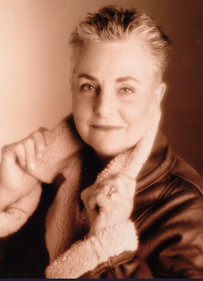
Carey, Brenda d.2014 the former head of Nursery at Air View Infants School in Silsden has died aged 68 after a brief illness. Originally from Salford and the Lake District, Mrs Carey trained as a teacher in Oxford and moved to Silsden with her husband, Mike, in the 1970s, raising three sons and running a popular playschool at her home.
She was appointed head of nursery at Aire View in 1985, and developed a reputation for creating an imaginative and inspiring environment. She also served as special needs co-ordinator for many years. On retirement from Aire View in 2004, she became a nursery consultant with Bradford local education authority.
Outside school life, Mrs Carey devoted her energies and creative skills to the community around her, in particular to the Methodist Church. She taught in Sunday school, and regularly led thoughtful and original nativity and ‘moving on’ services. She also contributed to the Silsden Churches Together group, including its Passiontide plays.
She and her husband launched the non-denominational Shell Club in 1989 for seven to 11-year-olds. Since then, they have worked with hundreds of children, promoting co-operative play, arts and crafts, and personal development. Mrs Carey was leading Shell Club activities as recently as three weeks ago. She also initiated Meet Other Mums, which has grown from an attendance of three at the initial session to a membership of more than 50 parents and infants at its weekly sessions. Mrs Carey was a founder of Silsden Community Productions, not only taking acting and production roles in its first two plays, but also encouraging the active involvement of young people in this new venture.
She was appointed head of nursery at Aire View in 1985, and developed a reputation for creating an imaginative and inspiring environment. She also served as special needs co-ordinator for many years. On retirement from Aire View in 2004, she became a nursery consultant with Bradford local education authority.
Outside school life, Mrs Carey devoted her energies and creative skills to the community around her, in particular to the Methodist Church. She taught in Sunday school, and regularly led thoughtful and original nativity and ‘moving on’ services. She also contributed to the Silsden Churches Together group, including its Passiontide plays.
She and her husband launched the non-denominational Shell Club in 1989 for seven to 11-year-olds. Since then, they have worked with hundreds of children, promoting co-operative play, arts and crafts, and personal development. Mrs Carey was leading Shell Club activities as recently as three weeks ago. She also initiated Meet Other Mums, which has grown from an attendance of three at the initial session to a membership of more than 50 parents and infants at its weekly sessions. Mrs Carey was a founder of Silsden Community Productions, not only taking acting and production roles in its first two plays, but also encouraging the active involvement of young people in this new venture.
|
Cook, Laurie 1950-'52 (pictured here with his wife Eileen) d.22 October 2022 born at Thurnscoe in the West Riding of Yorkshire May 1930, died in St Lukes Community Hospital in Market Harborough age 92. Laurie had been a local preacher since 1957 and lived his life to the full in the worshipping of his God.
|
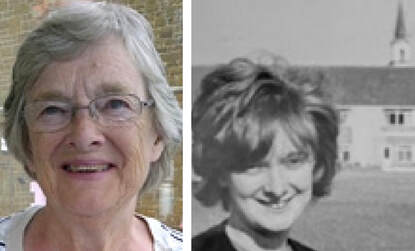 Anne Dean (Beck)
Anne Dean (Beck)
Dean, Anne (Beck)1962-65, d. October 2021 Our group of six girls who lived together at Westminster 1962-1965 consisted of Anne Beck, Catherine Lamb, Barbara Marston, Heather Marshall, Mary Giles and me, Catherine Haan. What wonderful friendships they were and we are still as close now in our late seventies as we were aged 18-21. It was therefore a great shock when we heard of Anne's sudden death in October, the first of our group to die.
Anne was popular with everyone she met at Westminster and beyond. Fellow students may remember her as an extremely efficient organiser of the newly created coffee bar. Before long there were regular visits to our house from another Westminster student, David Dean, and we were thrilled when these led to her marrying David in December 1967.
Anne was popular with everyone she met at Westminster and beyond. Fellow students may remember her as an extremely efficient organiser of the newly created coffee bar. Before long there were regular visits to our house from another Westminster student, David Dean, and we were thrilled when these led to her marrying David in December 1967.
The six of us ended up living many miles apart in Cumbria, Oldham, Shrewsbury, East Anglia and Cornwall, but we have still managed to meet all together at regular intervals. Because my family was in Cambridge and Anne and David were living in Ipswich and then Bury St Edmunds, we were near enough to see each other more often. They had two daughters and we had two sons, all of the same age, and the children grew up enjoying each others' company.
Anne enjoyed an excellent teaching career as well as teaching the piano privately and she influenced many young lives. As time passed, she and I often met for coffee, lunch, shopping or cinema in Cambridge or Bury. She adored her family and was so proud of two daughters and extended family and regaled me with stories of their doings so I felt as though I knew them all well. She was blessed with twin grandsons and for the last ten years, she helped look after them, even being part of their home schooling - in person and on Zoom during the pandemic.
Anne was a stalwart of Trinity Methodist Church, Bury St Edmunds, and held multiple offices there. Her faith was strong. For several years she organised some amazing Christmas tree festivals. She also started an 'Occasional Catering Service' for the church and rallied a willing team which raised hundreds of pounds over the years. She was an excellent cook and loved being in the kitchen so could not have been a more enthusiastic leader.
She loved music, theatre and reading and we had many an interesting discussion about something she or I had heard, seen or read recently. She had a warm personality and was always interested in other people and cared for them. When my husband was diagnosed with cancer and subsequently died, she and David were first on the scene with comfort and practical help and they continued to support me closely in the first years of my bereavement. We laughed at the same things and I always felt more cheerful and uplifted when we parted. After nearly sixty years of friendship, there will be a huge gap in my life without Anne and I know I am not the only person who feels this way.
Catherine Sharp (Haan) '65
Anne enjoyed an excellent teaching career as well as teaching the piano privately and she influenced many young lives. As time passed, she and I often met for coffee, lunch, shopping or cinema in Cambridge or Bury. She adored her family and was so proud of two daughters and extended family and regaled me with stories of their doings so I felt as though I knew them all well. She was blessed with twin grandsons and for the last ten years, she helped look after them, even being part of their home schooling - in person and on Zoom during the pandemic.
Anne was a stalwart of Trinity Methodist Church, Bury St Edmunds, and held multiple offices there. Her faith was strong. For several years she organised some amazing Christmas tree festivals. She also started an 'Occasional Catering Service' for the church and rallied a willing team which raised hundreds of pounds over the years. She was an excellent cook and loved being in the kitchen so could not have been a more enthusiastic leader.
She loved music, theatre and reading and we had many an interesting discussion about something she or I had heard, seen or read recently. She had a warm personality and was always interested in other people and cared for them. When my husband was diagnosed with cancer and subsequently died, she and David were first on the scene with comfort and practical help and they continued to support me closely in the first years of my bereavement. We laughed at the same things and I always felt more cheerful and uplifted when we parted. After nearly sixty years of friendship, there will be a huge gap in my life without Anne and I know I am not the only person who feels this way.
Catherine Sharp (Haan) '65
|
Delbridge, Jack, '68 b. 12 February 1946 d. 2 March 2023 age 77. After his time at Westminster College, Jack taught in secondary schools in Bracknell, Maidenhead, West Mosley, and Banstead holding various positions up to Senior Master. During this time he was seconded to Reading University for a year to study for a post graduate diploma in counselling.
He spent two years as a County Advisor in Schools Industry Links and Careers Guidance during which time he co-wrote a book for schools on the Rochdale Pioneers. After a year at Roehampton University to study for a MA in Education 1990-1991, Jack began his time as a Senior Lecturer at Roehampton. This entailed lecturing on the undergraduate degree course in Education and teaching a number of MA courses and modules in Education Management, Education Studies, Careers Guidance and Counselling. He remained there until he retired in 2008. |
Jack was an elected Councillor on Easthampstead Rural District Council and then Bracknell Borough Council. Various positions held including Leader of the Labour Group. Vice Chairman of the Council and chairman of various committees. As chairman of the leisure committee he was responsible for developing a municipal golf course, adding a swimming pool to the leisure centre and the opening of South Hill Park Arts Centre.
Jack was a Methodist Local Preacher, preaching for nearly sixty years, forty of them fully accredited. He held many offices in local Methodist churches at Byfleet, Weybridge and Worthing.
Jack was a Methodist Local Preacher, preaching for nearly sixty years, forty of them fully accredited. He held many offices in local Methodist churches at Byfleet, Weybridge and Worthing.
Eccles, Ruth, 1961-1964, d. 26 December 2022 Ruth was born to Samuel and Mary Hays in April 1943. She has an older brother David and a younger brother Philip. The family left Doncaster for Leigh-on-Sea, Essex after the war and at the age of 11 Ruth and I became friends. We were both in the same class at Westcliff High School for Girls and we have remained friends ever since. On finishing school, we both started Teacher Training at Westminster College in 1961 where girls had only recently been admitted. It was here that she met her future husband John on the first day of the three-year course.
She started her teaching career at Edwards Hall Primary School (Leigh-on-Sea), then moved to Westwood Primary School in Hadleigh. After the children were born she had a part time job helping children with learning difficulties at King John Secondary School in Benfleet, a modern school which became comprehensive in the late 1960s, where John taught Science.
After marrying John in 1966 at Highlands Methodist Church in Leigh-on-Sea, Rachel, her daughter was born in 1972 and Matthew, her son was born the following year. In 1977 Ruth, John and family then moved to Holbrook in Suffolk where she continued her career at Bentley Primary School. She took a great interest in Rachel and Matthew’s schooling as well as showing them the wider world of the UK and Europe touring around by caravan during the summer holidays.
Ruth retired from teaching at 60 and found new ways to help people, volunteering for the Witness Protection programme at Ipswich Magistrates Court and helping cancer sufferers at ICAN in Ipswich. In retirement they both enjoyed travelling to all corners of the world and especially to Seattle USA where their son now lives with his family. She took a great interest in her grandchildren Megan, Sam and Tudor helping them with school work, watching them play sport and teaching them how to cook! It was during covid that her teaching skills were put to use again. Tudor’s pre-school in Seattle was closed so every day for 60 to 90 mins on Face Time Ruth would have ‘Grannie School’ to make sure he didn’t miss out on the basics.
She continued her ties with Westminster College as a member of the East Anglian Westminster Society and enjoyed meeting up with Old W’s for outings and lunches. Old W’s Tom and Carol Pilkington’s son Steven gave Ruth’s grand-daughter Megan piano lessons whilst Chris and Stephanie Slack sometimes met them while caravanning. She and John also attended many college reunions. She was a member of Holbrook Methodist Church where her wonderful funeral service was held. It was broadcast on YouTube to many friends and Old W’s who were unable to travel to Suffolk.
Ruth was diagnosed with cancer in November 2022 and died with her family around her on Boxing Day morning. She was a Wife, Mum, Grannie, Sister, Auntie and a friend. We will miss you Ruth, you will be remembered by so many people for your friendship, helpfulness, kindness and courage. Madeleine Harvey (Foord). 1961-1964
She started her teaching career at Edwards Hall Primary School (Leigh-on-Sea), then moved to Westwood Primary School in Hadleigh. After the children were born she had a part time job helping children with learning difficulties at King John Secondary School in Benfleet, a modern school which became comprehensive in the late 1960s, where John taught Science.
After marrying John in 1966 at Highlands Methodist Church in Leigh-on-Sea, Rachel, her daughter was born in 1972 and Matthew, her son was born the following year. In 1977 Ruth, John and family then moved to Holbrook in Suffolk where she continued her career at Bentley Primary School. She took a great interest in Rachel and Matthew’s schooling as well as showing them the wider world of the UK and Europe touring around by caravan during the summer holidays.
Ruth retired from teaching at 60 and found new ways to help people, volunteering for the Witness Protection programme at Ipswich Magistrates Court and helping cancer sufferers at ICAN in Ipswich. In retirement they both enjoyed travelling to all corners of the world and especially to Seattle USA where their son now lives with his family. She took a great interest in her grandchildren Megan, Sam and Tudor helping them with school work, watching them play sport and teaching them how to cook! It was during covid that her teaching skills were put to use again. Tudor’s pre-school in Seattle was closed so every day for 60 to 90 mins on Face Time Ruth would have ‘Grannie School’ to make sure he didn’t miss out on the basics.
She continued her ties with Westminster College as a member of the East Anglian Westminster Society and enjoyed meeting up with Old W’s for outings and lunches. Old W’s Tom and Carol Pilkington’s son Steven gave Ruth’s grand-daughter Megan piano lessons whilst Chris and Stephanie Slack sometimes met them while caravanning. She and John also attended many college reunions. She was a member of Holbrook Methodist Church where her wonderful funeral service was held. It was broadcast on YouTube to many friends and Old W’s who were unable to travel to Suffolk.
Ruth was diagnosed with cancer in November 2022 and died with her family around her on Boxing Day morning. She was a Wife, Mum, Grannie, Sister, Auntie and a friend. We will miss you Ruth, you will be remembered by so many people for your friendship, helpfulness, kindness and courage. Madeleine Harvey (Foord). 1961-1964
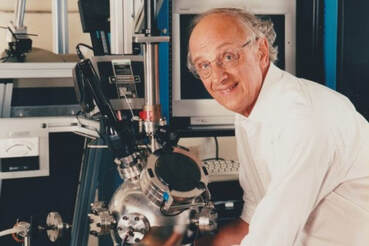 John Enderby
John Enderby
Enderby, Sir John Edwin, 1951-53, b. 16 January 1931, d. 3 August 2021, Professor of Physics, Bristol University 1976-96. John Edwin Enderby was born in Lincolnshire, on January 16, 1931. The family moved to Chester and John went to Chester Grammar School. He carried out national service in Egypt from 1949 to 1951 and said that working in the telecommunications centre of RAF Ismailia “convinced me of the importance of physics and mathematics”.
John obtained a Teacher’s Certificate with Distinction at Westminster College London in 1953, before taking up a position at Penge Secondary Modern School for Boys and at the same time starting evening classes as a part-time physics student at Birkbeck College, where he earned a first-class honours degree in 1957. He stayed at Birkbeck for his PhD, supervised by Norman Cu-sack; his research was concerned with the electrical properties of liquid metals.
John obtained a Teacher’s Certificate with Distinction at Westminster College London in 1953, before taking up a position at Penge Secondary Modern School for Boys and at the same time starting evening classes as a part-time physics student at Birkbeck College, where he earned a first-class honours degree in 1957. He stayed at Birkbeck for his PhD, supervised by Norman Cu-sack; his research was concerned with the electrical properties of liquid metals.
John lectured in Huddersfield from 1957-1960 and then moved to Sheffield University, where he was a lecturer and reader during the 1960s. A further move took John to a chair in Leicester University, where he became Head of Department. In 1976 John was appointed to a chair in Bristol Physics and served as Head of Department from 1981 until 1994, a long period interrupted from 1985-1988 when John took leave to be Directeur-Adjoint of the Institut Laue-Langevin (ILL) in Grenoble, the world’s premier neutron beam facility.
John’s research impacted across several areas of condensed matter physics and chemistry. He developed innovative ways of using neutrons to study the structure of disordered matter at the microscopic level. In 1966 John and his colleagues introduced the technique of neutron scattering with isotopic substitution which advanced fundamental understanding of the structure of multicomponent liquids - those made up of two or more types of atoms – including liquid alloys, glasses, liquid semiconductors and molten salts. Different isotopes scatter neutrons in different ways allowing the correlations between different species to be unravelled. This insight, and John’s ability to exploit it using newly developed neutron sources, proved enormously productive in determining the physics underlying the structure of binary liquid mixtures. Perhaps of more general scientific significance, John and colleagues pioneered physics research into how water molecules are ordered around ions in aqueous solutions. Their neutron studies provided seminal information about a problem that challenged physical chemists of the calibre of Pieter Debye and one that remains crucial in biophysics and biochemistry.
Top class scientists are not always willing to shoulder the burdens of administration. John was an exception. He was a huge servant to Bristol Physics and, indeed, to the wider science community. Briefly, John was elected FRS in 1985, and after retirement in 1996, served with distinction as Physical Secretary and Vice-President of the Royal Society from 1999 to 2004. He was awarded a knighthood in 2004 for services to science and technology and served as President of the Institute of Physics from 2004 to 2006. John was proud of his long association with the Institute of Physics Publishing (IOPP) in Bristol where he was scientific advisor. The University of Bristol recognized John’s contributions and his distinction with the award of an Honorary DSc in 2006.
Focusing on the man himself; John took delight in his children, gardening, and woodwork. He was a qualified association football referee and a long-term supporter of Leicester City. John possessed key 'people skills'; he was a magnificent team leader. Those of us who knew John personally will miss his zest for science, his wise advice, and his font of anecdotes, most of which we cannot disclose. His relationship with formal theory and theoreticians is summarized by "The only field theory I know is "Please shut the gate." John was, of course, an experimentalist.
John’s research impacted across several areas of condensed matter physics and chemistry. He developed innovative ways of using neutrons to study the structure of disordered matter at the microscopic level. In 1966 John and his colleagues introduced the technique of neutron scattering with isotopic substitution which advanced fundamental understanding of the structure of multicomponent liquids - those made up of two or more types of atoms – including liquid alloys, glasses, liquid semiconductors and molten salts. Different isotopes scatter neutrons in different ways allowing the correlations between different species to be unravelled. This insight, and John’s ability to exploit it using newly developed neutron sources, proved enormously productive in determining the physics underlying the structure of binary liquid mixtures. Perhaps of more general scientific significance, John and colleagues pioneered physics research into how water molecules are ordered around ions in aqueous solutions. Their neutron studies provided seminal information about a problem that challenged physical chemists of the calibre of Pieter Debye and one that remains crucial in biophysics and biochemistry.
Top class scientists are not always willing to shoulder the burdens of administration. John was an exception. He was a huge servant to Bristol Physics and, indeed, to the wider science community. Briefly, John was elected FRS in 1985, and after retirement in 1996, served with distinction as Physical Secretary and Vice-President of the Royal Society from 1999 to 2004. He was awarded a knighthood in 2004 for services to science and technology and served as President of the Institute of Physics from 2004 to 2006. John was proud of his long association with the Institute of Physics Publishing (IOPP) in Bristol where he was scientific advisor. The University of Bristol recognized John’s contributions and his distinction with the award of an Honorary DSc in 2006.
Focusing on the man himself; John took delight in his children, gardening, and woodwork. He was a qualified association football referee and a long-term supporter of Leicester City. John possessed key 'people skills'; he was a magnificent team leader. Those of us who knew John personally will miss his zest for science, his wise advice, and his font of anecdotes, most of which we cannot disclose. His relationship with formal theory and theoreticians is summarized by "The only field theory I know is "Please shut the gate." John was, of course, an experimentalist.
|
Galbraith, Dr Iain Baird, MTh 1999, d. 20 December 2021 at the Royal Alexandra Hospital, Paisley, with funeral at Lomond Parish Church, where he was organist.
Fellow member of that first Scottish MTh student cohort at Westminster, Rev Dr Graham D S Deans, writes: Iain was President of the Church Service Society 2012-14. He was a teacher by profession, but he may be remembered more for his musical gifts as a Church organist, in which capacity he served for over 60 years.He also had a passion for stained glass, and created a stained glass room in one of the churches where he served. Dr Galbraith was a recognised authority on stained glass in Scotland, and his work, which spanned 40 years, was accepted into the National Archives of Scotland. He was also a Church of Scotland elder and reader who played an active role in the Presbytery of Dumbarton for many years, and had the rare ability of being able to inspire so many young lives. There is an extended appreciation of his life and work in Vol 56 of the Record of the Church Service Society on pp. 1962-65. |
Gibbon, Jeff ‘John Jeffrey’, 1959-61, d. 3 October 2019, age 81, in Yorkshire, having retired there from his home in Barrow-in-Furness.
Gratton, Richard Edward, Eddie, 1959-61, d. 29 March 2022, age 83 The Guardian obituary
Hadnett, Richard, Dickie, BTh 1998, d. 1 August 2018 at Limerick Junction, Ireland.
Hoffman, Shane Arthur Bradford, BTh 1996-98, d. 19 March 2020. Shane was a co-founder of West London Churches Homeless Concern.
Gratton, Richard Edward, Eddie, 1959-61, d. 29 March 2022, age 83 The Guardian obituary
Hadnett, Richard, Dickie, BTh 1998, d. 1 August 2018 at Limerick Junction, Ireland.
Hoffman, Shane Arthur Bradford, BTh 1996-98, d. 19 March 2020. Shane was a co-founder of West London Churches Homeless Concern.
|
Ley, John '67, d. October 2022 A service of memorial and thanksgiving for the life of John Ley was held at St Helen's Church, Ranworth, on Monday 17th October 2022 at 2.30pm. A much loved family man, John truly lived life to the full! Never far from his beloved bikes, if John wasn't riding through the country lanes near Ranworth, he was sailing on the Broads with Diana, selflessly contributing to the community and church life in the village, or spending cherished time with his children and grandchildren.
Throughout John's illness and beyond, both John and Diana received support from Big C, the well known local cancer charity with a hub at the Norfolk & Norwich hospital. Whether it was advice, or a place to rest between appointments or have a cup of tea and a chat, Big C were there for them. And when John spent time in the hospital, Diana could also pop in for a chat with people who understood what they were going through. It is charities like this who make a huge difference throughout the toughest of times. These thoughts about John Ley are the recollections of Diana and the family, with a few spurious comments from me, John Scott, Diana's brother. John was the eldest of six children born to James and Pamela Ley. They lived in Grimsby on the Humber estuary. Sadly, in 1958 John’s father died, leaving Pamela to bring up the children on her own. There was support from their grandparents but they did not live close by. He was always active and restless, even as a teenager, and when John was 14 he decided to cycle to his grandparent’s home in Burton-on-Trent, a journey of about 120 miles each way. Brother Peter, aged 12, was of course roped in for the journey. Mother wrote to Grandma and told her when to expect the boys. So they set off on their bikes with sandwiches, a tent and a road map. When they thought they were half way there they saw a farm and knocked on the door to ask if they could put up their tent in a field, which they did. In the morning they packed up the tent, got on their bikes and finished the journey. ( I’ve looked it up, and Google Maps says the journey time cycling is nine and a half hours with no stopping! ) Grandmother was horrified they had cycled all that way on their own and made them go home by train, much to the disgust of John but a great relief to Peter. |
John first left school aged 15 and began working at a Paper Mill where he took samples of paper to be tested in the laboratory. He hated having to walk on iron gangways high up beside the loud rolling drums of paper. No health and safety equipment then! John was determined to change course, and do something else! Then in 1961, when John was 17, he was able to go back to school and return to study, so he enrolled at the local Technical College to take GCE ‘O’ and ‘A’ level exams, specialising in Sciences — this was at the same college where his late Father had taught baking. After all that hard work, in 1964 John gained a place at Westminster Teacher Training College, in Oxford. John was in his last year at Westminster College when he met Diana. She was a first year student who was living in the same house as one of John‘s third year science colleagues – whether that was the only link we are not sure, but the other thing that may have got his attention would probably have been Diana’s bike with drop handlebars and exotic Italian Campagnolo gears! She clearly remembers John’s comment following a group Saturday evening out to a local pub (typical Methodist students) …….“I will be in chapel tomorrow evening but I’m cycling to Cheltenham before that!” said John. A week later they said goodbye to each other to go home for Christmas. John couldn’t afford the train fare so always cycled – only Oxford to Grimsby via his Grandparent’s in Burton-on-Trent! ( I’ve checked that too, and Google Maps says it is 412 miles round trip taking 35 hours 12 minutes..) However on this occasion he had technical problems with his bike and had to borrow Diana’s front wheel! ( I’ve thought about this as John was always keen to have lightweight cycling components. Something in his new relationship with Diana was affecting his mind, as her front wheel had a dynamo built into it and was very heavy. I never heard him mention it afterwards… ).
At this point they barely knew each other but things quickly changed and very soon John had proposed! (Diana probably said “Yes, but can I have my wheel back?” ) This influenced where John then looked for his first teaching job, in Oxford to be near Diana while she finished her training. For the first year John cycled to work every day, but in 1968 splashed out on a Lambretta scooter for which both Diana and he got Provisional Driving Licences. It wasn’t long before Diana took and passed her motorcycle driving test, but John was never given a date he could accept for his test as it was always set on dates when he was teaching. However, in those days a learner was allowed to carry a passenger provided that person held a full motorbike licence, so they were able to drive together. Needless to say, on a journey from Oxford to Grimsby the Police did stop them - well a Lambretta with L plates, driven by a young man with young woman on the back seat seat did look suspicious. Diana can clearly remember the surprised look on the PC’s face as she carefully pulled out her red full licence from her pocket! On completion of her course at Westminster College they were married in Ruislip on the 19th July 1969 – the day before ‘man’ landed on the moon. However, after one year the itchy feet took hold and they set off on their first overseas adventure to Zambia. (They didn’t take everything with them, because for three years I was the lucky custodian of John’s record player and his collection of Beach Boys records…) John now had to pass his driving test in Zambia in order to get a car – after all he was teaching at a boys’ school 400 miles north of Lusaka and 250 miles north of the Copperbelt. Beyond there the journey was all dirt roads and a big river ferry. Long holidays always meant an adventure to Rhodesia (now Zimbabwe) to visit game parks to see wildlife and fantastic major wonders like Victoria Falls on the Zambezi and the Kariba dam. They saw Wildlife such as Zebras, baboons, giraffes, rhinos, buffaloes, leopards and all sorts of other animals, but sadly never any lions. They saw all sorts of birds.
Having arrived in Zambia in 1970 as just a couple, by early 1973 John was father to two boys, and it was time to return to England with Philip aged two and a half and Christopher just two months old. John got his old job back at Headington, Oxford, bought a house in Abingdon and of course — a new bike.
It wasn’t long before John’s (and Diana‘s) itchy feet began to tickle again and John applied to teach in Papua New Guinea. So after two years in Abingdon the house was rented out and this time the new bike was packed – John was not going to be without his beloved bike! Again he was teaching science in a third world country in a lovely warm sunny climate, but without any dangerous animals other than huge crocodiles and at least three different types of shark. Even so the beach was safe to swim in due to the abundance of fish and a coral reef. When later John went game fishing for tuna and barracuda, it was quite often that he only landed the fish’s head because a shark had taken the whole body!
In the seven years of living in PNG, two were spent at five and a half thousand feet above sea level at Mount Hagen, the name of a big town as well as that of a small mountain. While there, John climbed three mountains altogether with colleagues and a PNG guide. – Mount Hagen, in the western highlands, Mount Giluwe in southern highlands and Mount Wilhelm in the central highlands. Mount Hagen is the smallest at 11,000 feet but was the most difficult as there are no worn paths and most of the climb meant scrambling through tropical rainforest, over fallen trees and thorny creepers, but the bonus was seeing three or four different varieties of Bird of Paradise. Every two years the family flew home to the UK for Christmas but they always made sure the journey included a visit to somewhere en route. This involved opening an atlas to choose a place to visit such as Sri Lanka, Nepal and New Delhi, Hong Kong, or Bangkok. In later years visits were also made to Canada to visit John’s sister Rebecca, including a day trip to Niagara Falls, later to Phoenix, USA and the Grand Canyon as well as Australia to see friends made in Papua New Guinea where they visited Perth, Sydney, Canberra, Brisbane and Cairns, from where John saw humpback whales on the Great Barrier Reef. After seven fantastic years in PNG the family, now five and number (because Alison had arrived), returned to the UK in 1982 and settled in Norfolk where John continued to teach science but also to learn to use computers, working at Old Buckenham High School.
John’s main pastime returned to – you’ve guessed it – cycling, but also now involving the boys, Philip and Chris, as they had their own BMX bikes. This included racing and ferrying them all over East Anglia to compete in races. It wasn’t until Diana was involved in Girlguiding that boating became a second hobby. First kayaks – John was very wary of these to begin with, then, by chance, sailing. It will be this that influenced their move here to Ranworth, — first just as the place where the dinghy was kept and sailed from, until he and Diana moved into the village in 2004 when a bigger boat was added to the collection. Now it was possible to sleep on the boat and to venture further away, down the River Bure through Yarmouth, and across Breydon Water to the Southern Rivers. This involved dropping and raising the mast numerous times to navigate through all the bridges!
Through all these years there has always been a need for John and Diana to attend church, and for John it was important to do so within the community where he lived. In Attleborough at the Methodist Church, and here at St Helen’s where it was not long before he found himself to be the churchwarden – a service he continued to do faithfully for 15 years. A few years ago, when John was diagnosed with prostate cancer, I asked him how he was getting on. I was expecting a medical reply, but he replied, “Fine, but I’ve had to get a different saddle for my bike!” More recently, as John’s health problems became more serious, he had some hard decisions to make about his treatment, which he did very bravely. All this paints a picture of a man utterly determined to make progress for the benefit of Diana and his children. A grandfather five times over. A devoted teacher who was liked by his pupils. A man with a subtle and gentle sense of humour and a community spirit. A man with many good friends. John, WE are all very lucky to have known you.
At this point they barely knew each other but things quickly changed and very soon John had proposed! (Diana probably said “Yes, but can I have my wheel back?” ) This influenced where John then looked for his first teaching job, in Oxford to be near Diana while she finished her training. For the first year John cycled to work every day, but in 1968 splashed out on a Lambretta scooter for which both Diana and he got Provisional Driving Licences. It wasn’t long before Diana took and passed her motorcycle driving test, but John was never given a date he could accept for his test as it was always set on dates when he was teaching. However, in those days a learner was allowed to carry a passenger provided that person held a full motorbike licence, so they were able to drive together. Needless to say, on a journey from Oxford to Grimsby the Police did stop them - well a Lambretta with L plates, driven by a young man with young woman on the back seat seat did look suspicious. Diana can clearly remember the surprised look on the PC’s face as she carefully pulled out her red full licence from her pocket! On completion of her course at Westminster College they were married in Ruislip on the 19th July 1969 – the day before ‘man’ landed on the moon. However, after one year the itchy feet took hold and they set off on their first overseas adventure to Zambia. (They didn’t take everything with them, because for three years I was the lucky custodian of John’s record player and his collection of Beach Boys records…) John now had to pass his driving test in Zambia in order to get a car – after all he was teaching at a boys’ school 400 miles north of Lusaka and 250 miles north of the Copperbelt. Beyond there the journey was all dirt roads and a big river ferry. Long holidays always meant an adventure to Rhodesia (now Zimbabwe) to visit game parks to see wildlife and fantastic major wonders like Victoria Falls on the Zambezi and the Kariba dam. They saw Wildlife such as Zebras, baboons, giraffes, rhinos, buffaloes, leopards and all sorts of other animals, but sadly never any lions. They saw all sorts of birds.
Having arrived in Zambia in 1970 as just a couple, by early 1973 John was father to two boys, and it was time to return to England with Philip aged two and a half and Christopher just two months old. John got his old job back at Headington, Oxford, bought a house in Abingdon and of course — a new bike.
It wasn’t long before John’s (and Diana‘s) itchy feet began to tickle again and John applied to teach in Papua New Guinea. So after two years in Abingdon the house was rented out and this time the new bike was packed – John was not going to be without his beloved bike! Again he was teaching science in a third world country in a lovely warm sunny climate, but without any dangerous animals other than huge crocodiles and at least three different types of shark. Even so the beach was safe to swim in due to the abundance of fish and a coral reef. When later John went game fishing for tuna and barracuda, it was quite often that he only landed the fish’s head because a shark had taken the whole body!
In the seven years of living in PNG, two were spent at five and a half thousand feet above sea level at Mount Hagen, the name of a big town as well as that of a small mountain. While there, John climbed three mountains altogether with colleagues and a PNG guide. – Mount Hagen, in the western highlands, Mount Giluwe in southern highlands and Mount Wilhelm in the central highlands. Mount Hagen is the smallest at 11,000 feet but was the most difficult as there are no worn paths and most of the climb meant scrambling through tropical rainforest, over fallen trees and thorny creepers, but the bonus was seeing three or four different varieties of Bird of Paradise. Every two years the family flew home to the UK for Christmas but they always made sure the journey included a visit to somewhere en route. This involved opening an atlas to choose a place to visit such as Sri Lanka, Nepal and New Delhi, Hong Kong, or Bangkok. In later years visits were also made to Canada to visit John’s sister Rebecca, including a day trip to Niagara Falls, later to Phoenix, USA and the Grand Canyon as well as Australia to see friends made in Papua New Guinea where they visited Perth, Sydney, Canberra, Brisbane and Cairns, from where John saw humpback whales on the Great Barrier Reef. After seven fantastic years in PNG the family, now five and number (because Alison had arrived), returned to the UK in 1982 and settled in Norfolk where John continued to teach science but also to learn to use computers, working at Old Buckenham High School.
John’s main pastime returned to – you’ve guessed it – cycling, but also now involving the boys, Philip and Chris, as they had their own BMX bikes. This included racing and ferrying them all over East Anglia to compete in races. It wasn’t until Diana was involved in Girlguiding that boating became a second hobby. First kayaks – John was very wary of these to begin with, then, by chance, sailing. It will be this that influenced their move here to Ranworth, — first just as the place where the dinghy was kept and sailed from, until he and Diana moved into the village in 2004 when a bigger boat was added to the collection. Now it was possible to sleep on the boat and to venture further away, down the River Bure through Yarmouth, and across Breydon Water to the Southern Rivers. This involved dropping and raising the mast numerous times to navigate through all the bridges!
Through all these years there has always been a need for John and Diana to attend church, and for John it was important to do so within the community where he lived. In Attleborough at the Methodist Church, and here at St Helen’s where it was not long before he found himself to be the churchwarden – a service he continued to do faithfully for 15 years. A few years ago, when John was diagnosed with prostate cancer, I asked him how he was getting on. I was expecting a medical reply, but he replied, “Fine, but I’ve had to get a different saddle for my bike!” More recently, as John’s health problems became more serious, he had some hard decisions to make about his treatment, which he did very bravely. All this paints a picture of a man utterly determined to make progress for the benefit of Diana and his children. A grandfather five times over. A devoted teacher who was liked by his pupils. A man with a subtle and gentle sense of humour and a community spirit. A man with many good friends. John, WE are all very lucky to have known you.
|
Lucas, Pamela Turnbull, 1990-91, d.1 February 2021 in Toronto, Canada from a brief illness (cancer). During her life, she travelled the world with family and friends, and never stopped planning for the next trip. She was an avid motorcycle rider, having ridden a bike for more than 30 years, most recently her Harley Davidson Heritage Softail Classic. She thoroughly enjoyed riding her bike – no destination required (the ride was the destination!) and always came home from a ride with the biggest smile on her face! Pamela was a member of the Royal British Legion Riders Branch, CAV (Canadian Army Veterans Motorcycle Unit) with a handle of Piper (because she played the bagpipes) for a few years, and then joined the Motor Maids (oldest women's motorcycle club in Canada) in 2014. She loved riding with this group of women, exploring new destinations while riding with like-minded comrades.
Another of Pamela’s passions was delving into the Family Tree – long before it became a social phenomenon. She has been able to trace the family back 100’s of years and has connected with distant relatives both in her hometown of Gateshead as well as across the globe. She also took great delight in helping others to trace their roots. Pamela was an academic through and through, with three master’s degrees (in Social Work and Theology). She studied at Oxford (Westminster College 1990-91), Glasgow, Edinburgh and Johannesburg SA, and after emigrating to Canada, continued her studies there, doing courses at Ryerson and Lakehead Universities and Fleming College, and also continues with the Institute of Counselling in the UK, striving to stay current within her profession. Pamela worked as a Social Worker in the UK before training for ministry with the Theological Institute of the Scottish Episcopal Church in 1998. She was ordained deacon (2000) and priest (2001) in Durham Cathedral. When Pamela finished her curacy in the Diocese, she went to test her vocation with a religious community in London (2004-2006). After that, she worked for some years as a hospital chaplain in Basingstoke, and then emigrated to Canada (2008) where she has served as a full-time Hospital Chaplain and Psychotherapist at St. Michael's Hospital. Pamela served as a volunteer chaplain at Mount Sinai in 2009 as well as Rouge Valley, and has served as an Honorary Assistant at St. Monica, St. Peter, Carlton Street, St. Leonard, St. Cyprian, and most recently at St. Augustine of Canterbury Anglican churches in Toronto. Pamela felt a calling to be a Hospital Chaplain when she was still in school and followed that vocation throughout her life. As a social worker, priest, nun and chaplain/psychotherapist, she has made a difference, for good, in the lives of countless people. Her warmth, compassion, hunger for social justice, along with her bright smile and infectious laugh will be remembered by everyone. Pamela was cremated at a private service in Toronto, and her ashes were interred in Gateshead in October 2022. |
McArdell, Michael John, 1953, d. 1 July 2019, age 89 at Maldon, Essex.

Mumford, Kenneth John, 1948-52, former Westminster College governor, d. 1 November 2021. Son Andrew (alumnus of Southlands College) writes: Born in Bibury in 1928, Ken was brought up largely in the Black Country, where he moved from his parents’ Anglicanism to the local Methodists. Following National Service immediately after the war, in 1948 Ken went to Westminster College, London, for two years to train to teach. There he enjoyed playing rugby and listening to the great Methodist preachers of the day.
Ken’s first post, in 1950, was at the Methodist School in Witney, Oxfordshire. He joined High Street Methodist Church which was to remain his spiritual home for the rest of his life. Already a Local Preacher, he embarked on nearly 70 years as an active and respected preacher. Ken married Joyce in 1952, and in the following year the first of their three children was born.
In 1953 the Methodist School closed, and Ken was one of the staff appointed to the new Secondary Modern School. He and his lifelong friend Bill Patton (’48) were part of a small team of young teachers who took on the challenge of developing the ethos of a new school. He was given extra responsibilities, eventually becoming Head of Lower School, as well as helping the transition to a comprehensive school. At the same time he was contributing to national working parties and committees on the teaching of Religious Education.
In 1970, a new secondary school was planned for Carterton, serving the community around RAF Brize Norton. To his surprise, Ken was appointed as Head, and he took on the challenge of creating a new school with cutting edge ideas, especially in regard to the curriculum and to working with children with special educational needs.
Ken left Westminster College with a teaching qualification, but no degree. Early on he obtained an LCP qualification through home study, which was later given degree equivalence. In 1979 the LEA seconded Ken for a year to study for a Masters Degree at the University of Sussex, an experience he thoroughly enjoyed. He returned to Carterton for the remainder of his career, before retiring in 1986.
During this time, Ken served as a governor of the now Oxford-based Westminster College, and in many capacities at all levels in the Methodist Church. Throughout his career, Ken has a motto on his desk: People matter most. He lived this throughout his professional, personal and church lives. As well as his work in schools, Ken took a close interest in youth work in the town, was a regular contributor to ‘Talking News’, and was a committed member of the Rotary Club. On one occasion he was voted the town’s Citizen of the Year.
In retirement, Ken and Joyce enjoyed travel, especially to India and Nepal, and to Canada. As well as trekking in the Himalayas, including to Everest base camp (age 72!) Ken was a great supporter of the charity Wells for India (now WaterHarvest) and visited many of their projects in India. They also discovered Taizé and visited eleven times.
A teacher to the end, Ken had prepared a session for the church house group he and Joyce hosted, which was due to take place the day after his sudden death. The packed church and the hundreds who viewed the funeral service online were a testament to the esteem in which he was held. Ken is very much missed by Joyce and all the family, including 22 great-grandchildren, and also by the church and the wider community where he made such an impact.
Ken’s first post, in 1950, was at the Methodist School in Witney, Oxfordshire. He joined High Street Methodist Church which was to remain his spiritual home for the rest of his life. Already a Local Preacher, he embarked on nearly 70 years as an active and respected preacher. Ken married Joyce in 1952, and in the following year the first of their three children was born.
In 1953 the Methodist School closed, and Ken was one of the staff appointed to the new Secondary Modern School. He and his lifelong friend Bill Patton (’48) were part of a small team of young teachers who took on the challenge of developing the ethos of a new school. He was given extra responsibilities, eventually becoming Head of Lower School, as well as helping the transition to a comprehensive school. At the same time he was contributing to national working parties and committees on the teaching of Religious Education.
In 1970, a new secondary school was planned for Carterton, serving the community around RAF Brize Norton. To his surprise, Ken was appointed as Head, and he took on the challenge of creating a new school with cutting edge ideas, especially in regard to the curriculum and to working with children with special educational needs.
Ken left Westminster College with a teaching qualification, but no degree. Early on he obtained an LCP qualification through home study, which was later given degree equivalence. In 1979 the LEA seconded Ken for a year to study for a Masters Degree at the University of Sussex, an experience he thoroughly enjoyed. He returned to Carterton for the remainder of his career, before retiring in 1986.
During this time, Ken served as a governor of the now Oxford-based Westminster College, and in many capacities at all levels in the Methodist Church. Throughout his career, Ken has a motto on his desk: People matter most. He lived this throughout his professional, personal and church lives. As well as his work in schools, Ken took a close interest in youth work in the town, was a regular contributor to ‘Talking News’, and was a committed member of the Rotary Club. On one occasion he was voted the town’s Citizen of the Year.
In retirement, Ken and Joyce enjoyed travel, especially to India and Nepal, and to Canada. As well as trekking in the Himalayas, including to Everest base camp (age 72!) Ken was a great supporter of the charity Wells for India (now WaterHarvest) and visited many of their projects in India. They also discovered Taizé and visited eleven times.
A teacher to the end, Ken had prepared a session for the church house group he and Joyce hosted, which was due to take place the day after his sudden death. The packed church and the hundreds who viewed the funeral service online were a testament to the esteem in which he was held. Ken is very much missed by Joyce and all the family, including 22 great-grandchildren, and also by the church and the wider community where he made such an impact.
|
Nunn, Peter Handley '59, d. 28 November 2022 Peter was born in 1937 in the lovely Suffolk village of Walsham le Willows and died at home in Rustington, West Sussex. His early education was at the village school, but when he passed the 11 plus examination, his schooling took place in Bury St. Edmunds. His National Service (1955-57) was spent in the RAF, mostly in Bircham Newton, Kings Lynn, Norfolk. Peter studied Divinity and Mathematics at Westminster. His was the last year of W’s to leave college in 1959, before the move to Oxford. Peter was a fine organist and taught music and other subjects at various schools, first of all in Ipswich and later in Sussex. He was often seen at Westminster reunions where he would meet up with Peter Harper, Jim Rigby, Terry Hurrell, Dave Cook and Colin Johnson, all from his year.
|
Throughout his life, Peter was interested in work at Sunday Schools; during both years at college, he was part of a team of Westminster students that went to the Hackney area of London and helped with a Sunday School and Youth Club at the Methodist Church, Barnabas Road, Homerton, overseen by the Rev. Eric Roberts. Terry Harris (Kingpin) led other ‘59ers: Ivan Poole, John Evans, Jim Rigby, Peter Nunn (pianist), Terry Hurrell (pianist), Jack White (boxer) and Ken Armstrong ’58 in this project. They missed hearing some of the ‘big’ preachers of the day – such as: Leslie Weatherhead and Donald Soper - but were rewarded in knowing that they were doing God`s work in this part of London’s East End.
Peter became a headmaster in Ipswich and later at South Lancing Primary School and other schools in West Sussex. He and his friend, Gordon Shaw, also a teacher, enjoyed many caravan adventures, mostly in southern France. Gordon died in 2014, but Peter continued to live at 1 Frobisher Way, Rustington. He enjoyed directing a church choir and playing the organ at Ardingly Anglican Church and attending St. Mary’s, Clymping.
Terry Hurrell ’59, Halifax, Nova Scotia, Canada
Peter became a headmaster in Ipswich and later at South Lancing Primary School and other schools in West Sussex. He and his friend, Gordon Shaw, also a teacher, enjoyed many caravan adventures, mostly in southern France. Gordon died in 2014, but Peter continued to live at 1 Frobisher Way, Rustington. He enjoyed directing a church choir and playing the organ at Ardingly Anglican Church and attending St. Mary’s, Clymping.
Terry Hurrell ’59, Halifax, Nova Scotia, Canada
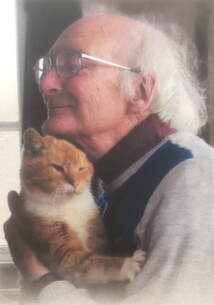 Maurice Page
Maurice Page
Page, Maurice Haydn, 1951, d. 31 March 2021 Maurice was described as a gentleman, gentle man, principled, humorous and loyal. He was a liberal and an optimist and loved music. He made a profound influence on many lives through teaching and scouting and was known to many as Kim (a leader’s name in scouting). Born in Clapton, east London, his parents both Salvation Army officers, he soon had to adapt to changing homes and schools, living in nine different places in ten years, eventually settling down in Brightlingsea, north Essex.
Following National Service, Maurice went to Westminster College, London and studied His first teaching appointment was at Witney Methodist School in Oxfordshire. Then he returned to Brightlingsea, teaching in Colchester and starting up a band and a choir. In 1957 Maurice and Beryl were married and then emigrated to Winnipeg, Canada, but this was shortlived and they returned to the Colchester area, with Maurice teaching at Stanway.
His ready wit and humour was always much to the fore in teaching, scouting and home. Maurice lived a full life, with wide interests which he shared with his family, pupils and the many associations he was a member of - the local choral society, the town partnership with Germany and the East Anglia area links of The Westminster Society. Throughout his long life, Maurice was a great source of encouragement to his pupils and the many people he met along life’s path. David Shearmur ’57
Following National Service, Maurice went to Westminster College, London and studied His first teaching appointment was at Witney Methodist School in Oxfordshire. Then he returned to Brightlingsea, teaching in Colchester and starting up a band and a choir. In 1957 Maurice and Beryl were married and then emigrated to Winnipeg, Canada, but this was shortlived and they returned to the Colchester area, with Maurice teaching at Stanway.
His ready wit and humour was always much to the fore in teaching, scouting and home. Maurice lived a full life, with wide interests which he shared with his family, pupils and the many associations he was a member of - the local choral society, the town partnership with Germany and the East Anglia area links of The Westminster Society. Throughout his long life, Maurice was a great source of encouragement to his pupils and the many people he met along life’s path. David Shearmur ’57
Sayers, Frank, 1944-48, d. April 2022.
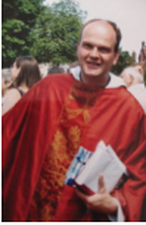 Joe Smith
Joe Smith
Smith, Joseph '95, d. 2 June 2022 Joe's ordained ministry began at St Mark's Talbot Village, then St Aldheims Branksome and on to St Peter's Bournemouth with St Stephen's and St Augustine. He married in 2021 and moved to Windsor. Sadly, he caught Covid and was in a hospice and hospital for twelve weeks.
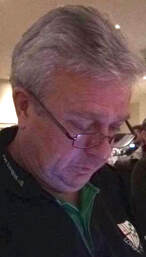 Andy Sloman
Andy Sloman
Sloman, Andrew P, Andy, 1975-78, d.3 November 2021 Andy was a true gentleman in every sense of the word. His dignity and sense of humour remained undiminished to the end. He will be fondly remembered and keenly missed.
Staves, Philip, Phil, 1956-58, d. 7 November 2021, age 85, at Friargate Hospital, Northallerton
Sweet, Alan Richard Lobb, 1954, d. 16 January 2022, age 89 after a period of ill health.
Sweet, Alan Richard Lobb, 1954, d. 16 January 2022, age 89 after a period of ill health.
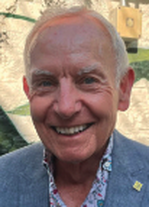 Keith Tewkesbury
Keith Tewkesbury
Revd Keith Tewkesbury ’64-‘67 d. December 2022
It is with a heavy heart that I am moved to offer a brief tribute to record the passing, late in 2022, of Keith Tewkesbury. Keith and I shared both a firm friendship, and accommodation, over our three years together at Westminster. As contemporaries will recall, Keith was, in his final year, a dedicated and highly efficient Union Society Treasurer. As a loyal member of the J.W.S., Sunday sorties out into the South Oxfordshire sticks, to conduct morning worship in small chapels, ‘where two or three were gathered together’ (often literally), was also very much part of his student life. He also managed to find the time to toil competitively, on behalf of the College Cross Country Club. He always held me responsible for his subsequent addiction to ‘the running bug’! In later years his fund-raising exploits, in the London Marathon (as recently as 2017!) and around North Wales, on behalf of ‘All We Can’ is well documented. In his own words: “I have been a supporter and advocate of ‘All We Can’ for many years. Most recently, I ran in support of this particularly worthy cause in the Snowdonia Half Marathon (May 2015). When I was Chaplain at Rydal Penrhos School, I took a party of students and members of staff to assist in our own small way with an ‘All We Can’ project in Uganda… I have seen first-hand what an incredible difference this initiative makes to the lives of some of the poorest people in East Africa”.
It is with a heavy heart that I am moved to offer a brief tribute to record the passing, late in 2022, of Keith Tewkesbury. Keith and I shared both a firm friendship, and accommodation, over our three years together at Westminster. As contemporaries will recall, Keith was, in his final year, a dedicated and highly efficient Union Society Treasurer. As a loyal member of the J.W.S., Sunday sorties out into the South Oxfordshire sticks, to conduct morning worship in small chapels, ‘where two or three were gathered together’ (often literally), was also very much part of his student life. He also managed to find the time to toil competitively, on behalf of the College Cross Country Club. He always held me responsible for his subsequent addiction to ‘the running bug’! In later years his fund-raising exploits, in the London Marathon (as recently as 2017!) and around North Wales, on behalf of ‘All We Can’ is well documented. In his own words: “I have been a supporter and advocate of ‘All We Can’ for many years. Most recently, I ran in support of this particularly worthy cause in the Snowdonia Half Marathon (May 2015). When I was Chaplain at Rydal Penrhos School, I took a party of students and members of staff to assist in our own small way with an ‘All We Can’ project in Uganda… I have seen first-hand what an incredible difference this initiative makes to the lives of some of the poorest people in East Africa”.
As was the case with a number of his contemporaries, on completing his 3 year Teaching Certificate, Keith committed to a two-year spell of VSO. He then briefly took up a teaching post before a strong pull to serve the needs of the Methodist Church led to his candidature for the Ministry, reading for a Theology degree at the late-lamented Hartley Victoria College, Manchester. Some twenty-five years in circuit postings culminated in an appointment as School Chaplain to Rydal Penrhos, in Colwyn Bay.
The January 2023, Rydal Penrhos Digest, a journal for the alumni, carried a fulsome acknowledgement of Keith’s eleven years’ service as chaplain and teaching member of Common Room. A retirement from the school environment, in 2009, saw him take up a no-less demanding appointment as Superintendent Minister of the Conwy & Prestatyn Circuit and Assistant Chair of Welsh Synod. Even after a further retirement from this posting in 2019 Keith, then at the age of 75, continued to serve as part-time chaplain to Coed Craig MHA in Rhos-on-Sea.
Keith’s Funeral Service was held, very appropriately, on 14 December, 2022 in the former St. John’s Methodist Church, Colwyn Bay, now the RPS School Chapel. Many warm tributes are on record, from the ‘Rydal Penrhos family’ and Westminster alumni alike. Peter Wilbourn and Mike Worsley, themselves key Union Society personnel in their own time, underline the measure of the man - PW: “A lovely man who made such an impression as a student and, I’m sure, in the classroom and pulpit in the years that followed”. MW: “I am very glad to have known him. He was a special example of lively and gracious Methodists”. Bob Williams ’64 -‘67
Wallis, Keith, 1972 d. 26 June 2023 age 72
Weller (Long), Elizabeth, Liz, 1968-72, d. December 2021 Husband Graham writes: Elizabeth had been battling cancer over a year and sadly succumbed just before Christmas to a particularly aggressive form of the disease. After graduating (myself in Engineering at Loughborough and Elizabeth at Westminster College - N house & P house) we married and moved to London. Elizabeth taught initially in Isleworth, then at Heathland High School in Housnlow, and later at South Lee School in Suffolk. We raised a family of three boys, two of whom have taught both here in the UK and in China. We have lived in Devon since retirmenet, where Liz was an avid gardener, and restored a much-neglected garden to its former glory. Wonderful memories… when we were undergrads, exploring the spires and environs of Oxford and some of the pubs, of course.
Wheeler, Eric A, 1952, d. late-2021 in Portsmouth.
The January 2023, Rydal Penrhos Digest, a journal for the alumni, carried a fulsome acknowledgement of Keith’s eleven years’ service as chaplain and teaching member of Common Room. A retirement from the school environment, in 2009, saw him take up a no-less demanding appointment as Superintendent Minister of the Conwy & Prestatyn Circuit and Assistant Chair of Welsh Synod. Even after a further retirement from this posting in 2019 Keith, then at the age of 75, continued to serve as part-time chaplain to Coed Craig MHA in Rhos-on-Sea.
Keith’s Funeral Service was held, very appropriately, on 14 December, 2022 in the former St. John’s Methodist Church, Colwyn Bay, now the RPS School Chapel. Many warm tributes are on record, from the ‘Rydal Penrhos family’ and Westminster alumni alike. Peter Wilbourn and Mike Worsley, themselves key Union Society personnel in their own time, underline the measure of the man - PW: “A lovely man who made such an impression as a student and, I’m sure, in the classroom and pulpit in the years that followed”. MW: “I am very glad to have known him. He was a special example of lively and gracious Methodists”. Bob Williams ’64 -‘67
Wallis, Keith, 1972 d. 26 June 2023 age 72
Weller (Long), Elizabeth, Liz, 1968-72, d. December 2021 Husband Graham writes: Elizabeth had been battling cancer over a year and sadly succumbed just before Christmas to a particularly aggressive form of the disease. After graduating (myself in Engineering at Loughborough and Elizabeth at Westminster College - N house & P house) we married and moved to London. Elizabeth taught initially in Isleworth, then at Heathland High School in Housnlow, and later at South Lee School in Suffolk. We raised a family of three boys, two of whom have taught both here in the UK and in China. We have lived in Devon since retirmenet, where Liz was an avid gardener, and restored a much-neglected garden to its former glory. Wonderful memories… when we were undergrads, exploring the spires and environs of Oxford and some of the pubs, of course.
Wheeler, Eric A, 1952, d. late-2021 in Portsmouth.
|
Whight, Dennis, 1948-52 b.1926-d.October 2022 – A good innings! Born in Bury St Edmunds, the youngest of nine children, to Florence and Frederick, he won a scholarship to the Culford Methodist School and was a keen sportsman and singer. He joined the RAF in 1944 and was posted to India during partition. On returning to the UK he went to Westminster College in 1948 and completed a degree in History at London University. In 1951 as the Social Secretary and MC of the College Hop he met the love of his life Gloria. In his words –
At that time I was starting my fourth year at Westminster, my teacher training year, and I was amongst many roles Social Club Secretary. At that time this was a demanding role as the College staged weekly hops, end of month dances at the Dragoons Hall and a Summer Ball in the nearby Caxton Hall. A limited number of invitations to the "Hops" went out to students at the London Colleges for ladies and there was no shortage of takers as the College 78 record collection of big band music was extensive. The Social Club Secretary was M.C. at all the Hops and Dances and at the Hops also manned the record player, starting with the signature tune of Tommy Dorsey's Opus One. |
At this first Hop of the year I was looking for a partner for the end of month dance as were a number of other Westminsterians such as Mervyn Uglow, Geoff Hunt, John Trewhella and Stan Barnes. The demands of the "Hop", however, left me little time to socialise and when I closed down the evening I hadn't found a partner. On the way back to my room I encountered a group from St Gabriel's College who were trying to find the way out to Horseferry Road. Being a gentleman I not only showed them the way out but I also walked them to Vauxhall Bridge Road to catch their trolleybus. The last to mount the bus was Gloria whom I had noticed enjoying the dancing and whom I now asked to be my partner at the end of month dance. "I'll let you know" she said and on the Thursday night she phoned to say "Yes!" Great Success and Relief! The rest as they say is History.
They were married on the shortest day, and longest night, of the year in December 1953.
They both started on a long career in teaching with Dennis working in Birmingham and Woodstock before obtaining a headship at Oundle Secondary Modern in 1962 and then moving to Uppingham Village College in 1971; remembered with respect and fondness by many of his pupils, every one of whose names and behaviours he knew.
He had a long sporting career, particularly in cycling, hockey, table tennis, tennis, walking, golf and, latterly, watching cricket. He was actively involved with the Rotary Club of Rutland, the Masons, the St. George’s Society, Wing Church, the Wing Village Hall, and other charities. Following an early singing background with the Methodists, he took up acting with the Oundle Gilbert & Sullivan Amateur Dramatic society and was a leading light in the many Wing pantomimes in the 80’s and 90’s. He loved picking out a tune on the piano or organ and writing poetry for family occasions.
He was a lay preacher and took many services in Wing at both the Methodist chapel and the Wing parish church, and in other parishes in Rutland for many years.
He and Gloria were blessed with four children (John, Julie, Helen, and Peter) and six grandchildren (Chris, Ollie, Peter, Ella, Charlie, and Jess). His very full life was celebrated by his family and many friends in a packed service at the parish church of St Peter & St Paul in Wing on 31st October 2022. He will be deeply missed.
They were married on the shortest day, and longest night, of the year in December 1953.
They both started on a long career in teaching with Dennis working in Birmingham and Woodstock before obtaining a headship at Oundle Secondary Modern in 1962 and then moving to Uppingham Village College in 1971; remembered with respect and fondness by many of his pupils, every one of whose names and behaviours he knew.
He had a long sporting career, particularly in cycling, hockey, table tennis, tennis, walking, golf and, latterly, watching cricket. He was actively involved with the Rotary Club of Rutland, the Masons, the St. George’s Society, Wing Church, the Wing Village Hall, and other charities. Following an early singing background with the Methodists, he took up acting with the Oundle Gilbert & Sullivan Amateur Dramatic society and was a leading light in the many Wing pantomimes in the 80’s and 90’s. He loved picking out a tune on the piano or organ and writing poetry for family occasions.
He was a lay preacher and took many services in Wing at both the Methodist chapel and the Wing parish church, and in other parishes in Rutland for many years.
He and Gloria were blessed with four children (John, Julie, Helen, and Peter) and six grandchildren (Chris, Ollie, Peter, Ella, Charlie, and Jess). His very full life was celebrated by his family and many friends in a packed service at the parish church of St Peter & St Paul in Wing on 31st October 2022. He will be deeply missed.

